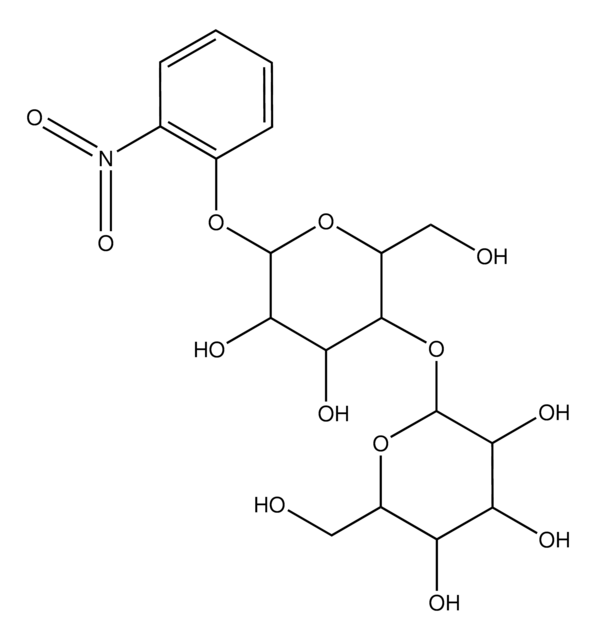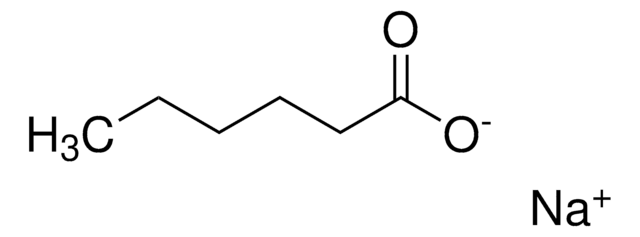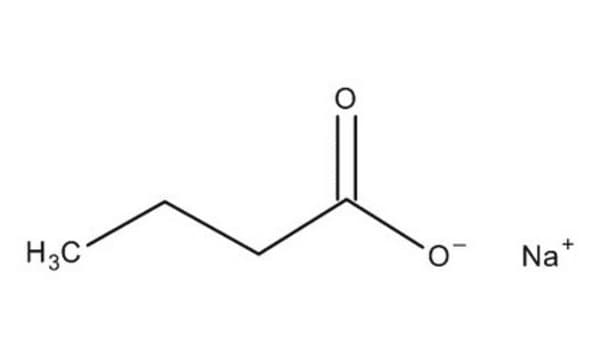P1880
Sodium propionate
≥99.0%
Synonym(s):
Propionic acid sodium salt
Sign Into View Organizational & Contract Pricing
All Photos(4)
About This Item
Linear Formula:
CH3CH2COONa
CAS Number:
Molecular Weight:
96.06
Beilstein:
3566934
EC Number:
MDL number:
UNSPSC Code:
12352107
PubChem Substance ID:
NACRES:
NA.25
Recommended Products
Quality Level
Assay
≥99.0%
form
powder
mp
285-286 °C (lit.)
solubility
H2O: 5 g/5mL
lipid type
unsaturated FAs
SMILES string
[Na+].CCC([O-])=O
InChI
1S/C3H6O2.Na/c1-2-3(4)5;/h2H2,1H3,(H,4,5);/q;+1/p-1
InChI key
JXKPEJDQGNYQSM-UHFFFAOYSA-M
Looking for similar products? Visit Product Comparison Guide
General description
Propionate is a short chain fatty acid, which is a major part of the luminal contents of the colon. It is associated with anti-inflammatory properties.
Application
Sodium propionate has been used as a supplement in transgalacto-oligosaccharides (TOS) medium for the isolation of bifidobacteria. It has been used as a supplement in SCFA (short-chain fatty acid) diet prepared for mice.
Storage Class Code
11 - Combustible Solids
WGK
WGK 1
Flash Point(F)
Not applicable
Flash Point(C)
Not applicable
Personal Protective Equipment
dust mask type N95 (US), Eyeshields, Gloves
Choose from one of the most recent versions:
Certificates of Analysis (COA)
Lot/Batch Number
Don't see the Right Version?
If you require a particular version, you can look up a specific certificate by the Lot or Batch number.
Already Own This Product?
Find documentation for the products that you have recently purchased in the Document Library.
Customers Also Viewed
Short-Chain Fatty Acids Protect Against High-Fat Diet-Induced Obesity via a PPAR?-Dependent Switch From Lipogenesis to Fat Oxidation.
den Besten G
Diabetes, 64, 2398-2398 (2015)
Culture-independent analysis of probiotic products by denaturing gradient gel electrophoresis.
Temmerman R
Applied and Environmental Microbiology, 69, 220-220 (2003)
Anti-inflammatory properties of the short-chain fatty acids acetate and propionate: a study with relevance to inflammatory bowel disease.
Tedelind S
World Journal of Gastroenterology, 13, 2826-2826 (2007)
Bingbing Cheng et al.
PloS one, 13(5), e0197380-e0197380 (2018-05-11)
Treatment of prosthetic joint infections often involves multiple surgeries and prolonged antibiotic administration, resulting in a significant burden to patients and the healthcare system. We are exploring a non-invasive method to eradicate biofilm on metal implants utilizing high-frequency alternating magnetic
Identification and antibiotic susceptibility of bacterial isolates from probiotic products.
Temmerman R
International Journal of Food Microbiology, 81, 1-1 (2003)
Our team of scientists has experience in all areas of research including Life Science, Material Science, Chemical Synthesis, Chromatography, Analytical and many others.
Contact Technical Service









